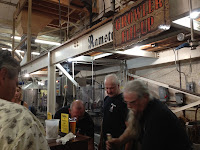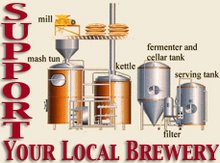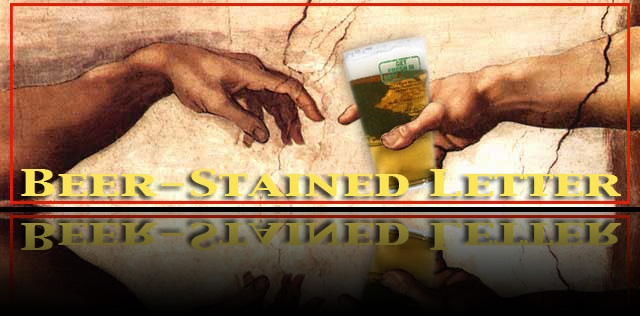Oktoberfest is alive and well
This time a year ago, you could find some Internet chatter using Oktoberfest as a punching bag. (Find it here and here.)
The gist of those two observations is: The US craft beer market is awash in crappy takes – poorly executed or just plain wrong – on a hallowed German style that the Germans themselves have essentially forsaken by putting profit over quality and tradition. In that regard, American brewers should heed the call to rescue it, like they've done with some Belgian styles.
Meanwhile, Oktoberfest as an event has become this tourist-trap-hijacked drunkfest of a calendar date, that most of Germany, save Bavaria, ignores. To be a good student of beer you should be savvier and explore what else Deutschland has to offer.
 There's some truth to these observations. Oktoberfest beers dispatched from the homeland to this market are disappointing, and a Web search for Oktoberfest will overrun your browser with hits for booking a trip to Munich. (That's been the case for a while, a well-worn lament by now.)
There's some truth to these observations. Oktoberfest beers dispatched from the homeland to this market are disappointing, and a Web search for Oktoberfest will overrun your browser with hits for booking a trip to Munich. (That's been the case for a while, a well-worn lament by now.)
But, in terms of signal to noise, there's plenty of noise in these observations. For one thing, märzen beer is still alive and well – in the US. There may be plenty of dreck out there, but there's also plenty of cream (that's been the case with craft beer for a while now), as American brewers spot an opening and re-create, even re-imagine, a beer.
As for Oktoberfest the event, it is what it is: a seasonal money-maker for it host city. That's the tilt of the Earth these days. No sense in crying over tipped beer.
And, as far as the subset point goes, that Germans make other brews besides fest beers, well duh. In the craft beer world, hardly anyone thinks (or thought) fest beer is all Germany ever brings to the table.
Even in New Jersey and its environs, where down-the-nose looks our way think us a bit behind the curve, brews like rauchbier, gose and snappy Berliners have been in the mugs for some time, either by our brewers or found on packaged goods stores' import shelves. Germany is not in its rookie season in here in the states, and thanks to the Web, beer drinkers here get around without having stray too far from home (read that as exposure, access to styles, style information).
No matter what the Germans brew these days – and to be sure, they have been dumbing down the fest beer for years now – Americans aren't, nor can they be expected, to be keepers of beer flames. American brewers hate rules as much as they respect them.
For US brewers, styles are as much a blueprint or suggestion as they are, well, the actual style. American craft brewers are too inclined to rewrite the rules, deconstruct them and rebuild them in a hybrid, a mash-up, or cover the style by doing a stellar job at it. That's what American craft brewers do well. It's not so much being the keeper of a flame, but rather, picking up where someone else left off and putting your own stamp on it.
 "Is it true that the spectrum of Oktoberfests that were available last year really wasn't that exciting? Absolutely. But that's how craft beers have flourished: They've been better than the competition," says Greg Zaccardi, whose High Point Brewing last week released its 2012 incarnation of Ramstein Oktoberfest Lager Beer, the first of 180 barrels of the seasonal planned for this year. "When the competition becomes lame, you have a great opportunity. If what was arriving here was knocking it out of the park, it would be harder for everybody."
"Is it true that the spectrum of Oktoberfests that were available last year really wasn't that exciting? Absolutely. But that's how craft beers have flourished: They've been better than the competition," says Greg Zaccardi, whose High Point Brewing last week released its 2012 incarnation of Ramstein Oktoberfest Lager Beer, the first of 180 barrels of the seasonal planned for this year. "When the competition becomes lame, you have a great opportunity. If what was arriving here was knocking it out of the park, it would be harder for everybody."
High Point Brewing (located in Butler) was founded as a wheat beer brewery in the German tradition and has produced the decoction-mashed fall märzen for 14 of its 16 years in business, the very first batches being made at the request of a now-closed German restaurant in Atlantic Highlands. Ramstein Oktoberfest enjoys high marks from the critics and continues to draw big crowds to the brewery on the second Saturday of September, its annual release date.
 "For our concept, for who we are, we've always taken a lead from the traditional style guidelines and put our own thumbprint (and) signature on that by tweaking it in the direction we find to be exciting," Greg says. "That means we have to start with being as good as the benchmark for that style and doing something that makes it a little better."
"For our concept, for who we are, we've always taken a lead from the traditional style guidelines and put our own thumbprint (and) signature on that by tweaking it in the direction we find to be exciting," Greg says. "That means we have to start with being as good as the benchmark for that style and doing something that makes it a little better."
At Climax Brewing, doppelbocks, märzens, helles and Oktoberfests are genuinely a matter of heritage. Dave Hoffmann, owner of the Roselle Park brewery, is a New Jerseyan, but a German, too, via both parents. Screwing up the style is a sacrilege, and something that flies in face of his beer-drinking experience. Märzens and bocks are among his favorites.
Elsewhere around the state and country, there are able interpretations of the fall style (Left Hand in Colorado and Great Lakes Brewing in Cleveland come to mind), but things get more elaborate than just capitalizing on a seasonal.
For a while now, Tom Stevenson at Triumph Brewing in Princeton has made those goses, rauchbiers, among other Old World styles (including gruit, a style Tim Kelly at Atlantic City's Tun Tavern has made as well). Carton Brewing (Atlantic Highlands) makes a quite-worthy Berliner. At some point, these brews become more than an introduction to beer: They develop a wide following and generate expectations.
 But back to an earlier point ... There are some things that Internet chatter got right. Namely, there is bad märzen out there (try a Leinenkugel's if you don't think so; at venerated Boston Beer Company, the Octoberfest – that's their spelling – grades a B+ at most. But that speaks to their craft-beer bandwidth – above-average, serviceable beers that are accessible to a very wide audience.)
But back to an earlier point ... There are some things that Internet chatter got right. Namely, there is bad märzen out there (try a Leinenkugel's if you don't think so; at venerated Boston Beer Company, the Octoberfest – that's their spelling – grades a B+ at most. But that speaks to their craft-beer bandwidth – above-average, serviceable beers that are accessible to a very wide audience.)
Honestly, though, the observation about bad beers in the marketplace is one that really knows no exclusive style, nor season, meaning it's hardly exclusive to Oktoberfest beers. You can say it about virtually every beer style out there, every seasonal. Alongside the good and the great, there are bad IPAs, bad APAs, bad wits, bad summer seasonals, dubious pumpkin ales, out-of-balance winter warmers, crappy stouts and lame porters. The craft beer market is crowded and getting more crowded. Not everyone hits the mark, and sadly, sometimes it shows.
On the other point, Slob-toberfest ... well, Oktoberfest in the US is very much Cinco de Mayo in lederhosen. But then, Cinco de Mayo is St. Patrick's Day dancing to a mariachi band. And Halloween is a tavern party in a witch's hat, meaning all of those calendar events have devolved into bar promotions of some sort. It's been that way for too long to think about. And the atmosphere surrounding that says, So what? It's business. If you're a brewer, and a bar wants to feature your beer, seasonal or not, you want the tap handle.
Meanwhile, Oktoberfest in Munich is indeed one of the city's paydays, something it can rely on to generate revenues, fill hotels, plow money into the local economy, never mind how it started or what it used to be in the eyes of anyone. It is what it is, and for Munich, it's not unlike New York counting on a lot of people showing up in Times Square on New Year's Eve, or Louisville depending on a Kentucky Derby bounce the first Saturday of every May.
Again, so what? It's commerce.
Just like brewers producing a seasonal, i.e. Oktoberfest ... it's commerce, a business decision. If it plays, it pays. Ask any brewer if having a reliable revenue stream is worth the trouble, the answer is likely to be "yes."
"For us, it's really important to look at celebrating what we strive to do well," Greg says.
The gist of those two observations is: The US craft beer market is awash in crappy takes – poorly executed or just plain wrong – on a hallowed German style that the Germans themselves have essentially forsaken by putting profit over quality and tradition. In that regard, American brewers should heed the call to rescue it, like they've done with some Belgian styles.
Meanwhile, Oktoberfest as an event has become this tourist-trap-hijacked drunkfest of a calendar date, that most of Germany, save Bavaria, ignores. To be a good student of beer you should be savvier and explore what else Deutschland has to offer.
 There's some truth to these observations. Oktoberfest beers dispatched from the homeland to this market are disappointing, and a Web search for Oktoberfest will overrun your browser with hits for booking a trip to Munich. (That's been the case for a while, a well-worn lament by now.)
There's some truth to these observations. Oktoberfest beers dispatched from the homeland to this market are disappointing, and a Web search for Oktoberfest will overrun your browser with hits for booking a trip to Munich. (That's been the case for a while, a well-worn lament by now.)But, in terms of signal to noise, there's plenty of noise in these observations. For one thing, märzen beer is still alive and well – in the US. There may be plenty of dreck out there, but there's also plenty of cream (that's been the case with craft beer for a while now), as American brewers spot an opening and re-create, even re-imagine, a beer.
As for Oktoberfest the event, it is what it is: a seasonal money-maker for it host city. That's the tilt of the Earth these days. No sense in crying over tipped beer.
And, as far as the subset point goes, that Germans make other brews besides fest beers, well duh. In the craft beer world, hardly anyone thinks (or thought) fest beer is all Germany ever brings to the table.
Even in New Jersey and its environs, where down-the-nose looks our way think us a bit behind the curve, brews like rauchbier, gose and snappy Berliners have been in the mugs for some time, either by our brewers or found on packaged goods stores' import shelves. Germany is not in its rookie season in here in the states, and thanks to the Web, beer drinkers here get around without having stray too far from home (read that as exposure, access to styles, style information).
No matter what the Germans brew these days – and to be sure, they have been dumbing down the fest beer for years now – Americans aren't, nor can they be expected, to be keepers of beer flames. American brewers hate rules as much as they respect them.
For US brewers, styles are as much a blueprint or suggestion as they are, well, the actual style. American craft brewers are too inclined to rewrite the rules, deconstruct them and rebuild them in a hybrid, a mash-up, or cover the style by doing a stellar job at it. That's what American craft brewers do well. It's not so much being the keeper of a flame, but rather, picking up where someone else left off and putting your own stamp on it.
 "Is it true that the spectrum of Oktoberfests that were available last year really wasn't that exciting? Absolutely. But that's how craft beers have flourished: They've been better than the competition," says Greg Zaccardi, whose High Point Brewing last week released its 2012 incarnation of Ramstein Oktoberfest Lager Beer, the first of 180 barrels of the seasonal planned for this year. "When the competition becomes lame, you have a great opportunity. If what was arriving here was knocking it out of the park, it would be harder for everybody."
"Is it true that the spectrum of Oktoberfests that were available last year really wasn't that exciting? Absolutely. But that's how craft beers have flourished: They've been better than the competition," says Greg Zaccardi, whose High Point Brewing last week released its 2012 incarnation of Ramstein Oktoberfest Lager Beer, the first of 180 barrels of the seasonal planned for this year. "When the competition becomes lame, you have a great opportunity. If what was arriving here was knocking it out of the park, it would be harder for everybody."High Point Brewing (located in Butler) was founded as a wheat beer brewery in the German tradition and has produced the decoction-mashed fall märzen for 14 of its 16 years in business, the very first batches being made at the request of a now-closed German restaurant in Atlantic Highlands. Ramstein Oktoberfest enjoys high marks from the critics and continues to draw big crowds to the brewery on the second Saturday of September, its annual release date.
 "For our concept, for who we are, we've always taken a lead from the traditional style guidelines and put our own thumbprint (and) signature on that by tweaking it in the direction we find to be exciting," Greg says. "That means we have to start with being as good as the benchmark for that style and doing something that makes it a little better."
"For our concept, for who we are, we've always taken a lead from the traditional style guidelines and put our own thumbprint (and) signature on that by tweaking it in the direction we find to be exciting," Greg says. "That means we have to start with being as good as the benchmark for that style and doing something that makes it a little better."At Climax Brewing, doppelbocks, märzens, helles and Oktoberfests are genuinely a matter of heritage. Dave Hoffmann, owner of the Roselle Park brewery, is a New Jerseyan, but a German, too, via both parents. Screwing up the style is a sacrilege, and something that flies in face of his beer-drinking experience. Märzens and bocks are among his favorites.
Elsewhere around the state and country, there are able interpretations of the fall style (Left Hand in Colorado and Great Lakes Brewing in Cleveland come to mind), but things get more elaborate than just capitalizing on a seasonal.
For a while now, Tom Stevenson at Triumph Brewing in Princeton has made those goses, rauchbiers, among other Old World styles (including gruit, a style Tim Kelly at Atlantic City's Tun Tavern has made as well). Carton Brewing (Atlantic Highlands) makes a quite-worthy Berliner. At some point, these brews become more than an introduction to beer: They develop a wide following and generate expectations.
 But back to an earlier point ... There are some things that Internet chatter got right. Namely, there is bad märzen out there (try a Leinenkugel's if you don't think so; at venerated Boston Beer Company, the Octoberfest – that's their spelling – grades a B+ at most. But that speaks to their craft-beer bandwidth – above-average, serviceable beers that are accessible to a very wide audience.)
But back to an earlier point ... There are some things that Internet chatter got right. Namely, there is bad märzen out there (try a Leinenkugel's if you don't think so; at venerated Boston Beer Company, the Octoberfest – that's their spelling – grades a B+ at most. But that speaks to their craft-beer bandwidth – above-average, serviceable beers that are accessible to a very wide audience.) Honestly, though, the observation about bad beers in the marketplace is one that really knows no exclusive style, nor season, meaning it's hardly exclusive to Oktoberfest beers. You can say it about virtually every beer style out there, every seasonal. Alongside the good and the great, there are bad IPAs, bad APAs, bad wits, bad summer seasonals, dubious pumpkin ales, out-of-balance winter warmers, crappy stouts and lame porters. The craft beer market is crowded and getting more crowded. Not everyone hits the mark, and sadly, sometimes it shows.
On the other point, Slob-toberfest ... well, Oktoberfest in the US is very much Cinco de Mayo in lederhosen. But then, Cinco de Mayo is St. Patrick's Day dancing to a mariachi band. And Halloween is a tavern party in a witch's hat, meaning all of those calendar events have devolved into bar promotions of some sort. It's been that way for too long to think about. And the atmosphere surrounding that says, So what? It's business. If you're a brewer, and a bar wants to feature your beer, seasonal or not, you want the tap handle.
Meanwhile, Oktoberfest in Munich is indeed one of the city's paydays, something it can rely on to generate revenues, fill hotels, plow money into the local economy, never mind how it started or what it used to be in the eyes of anyone. It is what it is, and for Munich, it's not unlike New York counting on a lot of people showing up in Times Square on New Year's Eve, or Louisville depending on a Kentucky Derby bounce the first Saturday of every May.
Again, so what? It's commerce.
Just like brewers producing a seasonal, i.e. Oktoberfest ... it's commerce, a business decision. If it plays, it pays. Ask any brewer if having a reliable revenue stream is worth the trouble, the answer is likely to be "yes."
"For us, it's really important to look at celebrating what we strive to do well," Greg says.














